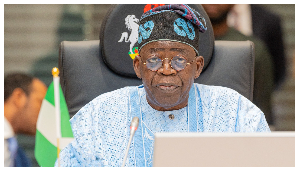Ghana is taking its investment drive next to the capital of Equatorial Guinea, Malabo.
The move being engineered by the Ghana Chamber of Commerce and Industry is taking the form of a solo exhibition from the 1st to the 7th of June this year.
Equatorial Guinea has become the spot of most investors because of the booming oil industry producing some 300,000 barrels a day.
It is one of the fastest growing economies in the world with a per capita income of 3,680 dollars, a real GDP growth rate of 14.2 percent and a single digit inflation rate.
Speaking at a media briefing, the 1st Vice President of the Chamber Wilson Krofa, said the booming economy of Equatorial Guinea is the main source of attraction for the chamber.
He says Equatorial Guinea presents a lot of opportunities that Ghanaian businesses can explore and urged the business community to take advantage of the solo exhibition to do business in that country
? Business thrives on income and once the income per head is strong and the market is yet to be developed, I think that those things put together will provide the opportunity for the country to grow. Before independence our population was four million, now it is 20 million so I think that this is the right time to go to Equatorial Guinea in order to take full advantage of the potential that we think exist in that country,? he says.
Equatorial Guinea is currently rebuilding its infrastructure, and the country is in dire need of skilled labour and training institutions. Currently some hundred students from that country are studying in Ghana. A
And these are opportunities that the Chamber of Commerce believes must be tapped.
Meanwhile, the Ghana National Chamber of Commerce and Industry is calling for dispassionate discussions of unfair competition that local industry faces.
According to the chamber more research needs to be done to ascertain if it is simply a case of cheap imports killing local industry or if the local industry is suffering from inefficient methods of production.
Reacting to the debate on collapsing local industries particularly textiles and poultry, Mr. Krofa says the chamber is discussing with government over the issue and believes that a blanket statement that the problem is due to cheap imports will be misplaced.
? There are various aspects of competition. It may be that our local people do not have the skills and equipment to increase productivity to the highest level as imported goods, so what I am saying is that we should not take just one element of the problem but rather sit down with government and analyze the issues,? he says.
Business News of Tuesday, 26 April 2005
Source: --












